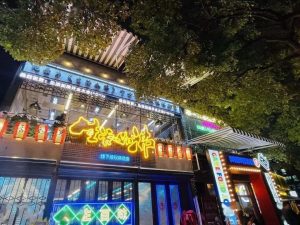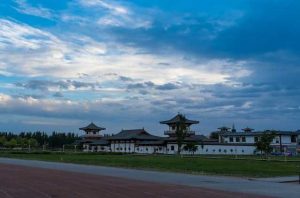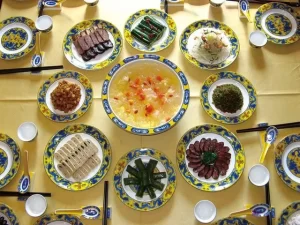
A battle about the advent of documentaries.
Source|Flow Park
ID: llpark001
Author|Yan Ye
Editor: Han Xiao Huang
At either end of Shanghai's University Road, two documentary-licensed restaurants, Life on a Skewer and Life as a Boil, are in full swing, one burning kebabs and the other cooking hot pots.
Perhaps because of their proximity to Shanghai University of Finance and Economics and Fudan University, the two restaurants are blessed with queues as long as any of the new consumer brands and, by the same token, prices of 100+ per person.

But not only do the diners not find it hard work, but most of them come here by name, bringing with them screenshots of the food footage from both documentaries and naming them to try the same dishes. They said they felt from the bottom of their hearts that they could eat all the country's food here.
It is clear that this generation of young people has a different affinity for documentaries.
Three years after its launch on B, the first season of "Life as a String" had 88.156 million views and its sequel even had 110 million views, while "Life as a Boil", which was launched the following year, also had 23.866 million views, so you can basically have someone to "watch" it with you whenever you open it.

The documentary is no longer a boring classroom of knowledge, but a book of insight and a pair of binoculars to help them travel the world.
At the other end of the telescope are the people in the industry who are making the shift.
They have walked, done and doubted in order to move documentaries from niche to popular and create a separate section from a corner of film and television.
How does a hit documentary get produced? And how does it satisfy the visual taste buds of discerning young people?
To this end, Flow Park spoke to Li Xiang, director of the documentary "Life as a Boil", to hear his story of the documentary's progression.
Emotion and sorrow through the lens
After one episode of "Life as a String" went live, Li Xiang, who used to be the editor-in-chief of Tianjin TV, keenly smelled the heat. He immediately produced and approached B-site with a production proposal, and the two sides hit it off immediately with a demo. Thus, after 16 months of intensive preparation, "Life as a String", the sister programme of "Life as a String", went live.
In contrast to the smoky, nourishing skewers of Life as a Kebab, Life as a Boil does not focus on the sensual excitement of the food, but more on the emotional story behind the hot pot.

In Li Xiang's heart, food is never far from a story, and those stories of either a passionate heritage of traditional craftsmanship or an indomitable approach to ordinary life are the most warm and powerful.
To unearth these stories, Li Xiang spent more than six months travelling to more than two dozen cities across the country with a team of post-90s. With the help of local food vloggers, self-publishers and others, he found hot pot restaurant owners with hidden stories in the city sides and alleyways.
Once in Taiwan Province, Li Xiang came across a Shantou hotpot restaurant whose founder had passed away, leaving the shop to a forgotten friend in Kaohsiung. The current owner recalls that the shop's founder was brought to Taiwan from Shantou decades ago, and it was the Shantou salsa that locked up his memories of his hometown during his years in a foreign land.
Nostalgia and hotpot.

The story was eventually selected for the third episode of Life as a Boil, a short eight-minute video clip in which Li Xiang and his team spent over a month in Taiwan, from interviewing to understand the story, to actually following the footage.
The entire documentary, 7 episodes, and dozens of hot pot restaurants are polished a little in this way.
Even though good stories are hard to find, Li Xiang still maintains a high elimination rate of 1:5 for interviewees.
In Li Xiang's view, hotpot is an interpretation of life, and without a good and touching story to rely on, it is like a hotpot without a soup base, which is boring.
So even if there are some viewers who are eager to hit the hot pot restaurants through Life as Boiling, or simply watch the food documentary as a food podcast, not quite buying it, even if it only garners a 7.7 rating on B-site, Li Xiang does not intend to change his style.
In the comment section of Life Is Like Boiling, Li Xiang commented, "We titled the film Life Is Like Boiling because we want to use the vehicle of hot pot to focus more on the boiling in our lives that may be overlooked and may be abandoned when we are wrapped up in life."
For him, even at a time when documentaries are gradually becoming commercialised and entertaining, they must always maintain a certain educational function, and even more so on a platform like B-site, where young people are the main audience.
So, for the upcoming second season of Life as a Boil next year, he says that where you fall, you don't get up.
Cashing in on traffic for documentaries
In the offline hotpot restaurants of Life as Boiling, LED screens scrolled with golden quotes from the documentary.
"The usual, just fondue."
"It's a rare feeling of happiness when the pot is hot and piping hot inside and the world is outside."
……
The moody theme, coupled with the unique secondary decor of the B-station, has attracted many people to come and take photos or have a couple of bites of the same food. Anyway, it seems that if you come here, you've earned it.
Prior to this, a well known example is that in 2012, when "China on the Edge of the Tongue" burst onto the scene, all the stock of Yunnan's Nodeng ham was bought up by diners on Taobao within a day of the film's broadcast.

Yunnan Nuodeng Ham in "China on the Tongue
Clearly, this is the limitless possibility that documentaries offer.
This traffic realisation was felt by Li Xiang, it was felt by B-site, and the owners of those hotpot restaurants recorded on camera were the beneficiaries.
During the return visit, many hot pot restaurant owners responded to Li Xiang that within two days of the launch of their own parts of the film "Life as Boiling", many local diners spontaneously found the small, inconspicuous-looking restaurants from the film's traces, and then opened the corresponding locations of the documentary while eating according to the inside until their mouths were full of oil. Translated with www.DeepL.com/Translator (free version)
But, this quick traffic realisation applies to the more inclusive hotpot, what about the rest?
Li Xiang gives his answer from his own experience.
"Some shops don't take the traffic seriously, he only has 500 bowls of tofu brains a day and even if he was provided with the traffic to sell 1,000 bowls, they could hardly afford that hard work and simply refused."
Immediately after the finale of "Life is Boiling", Li Xiang's team started looking into breakfast-related material, in preparation for a breakfast documentary with B-site. But surprisingly, the breakfast stall owners, who were early in the day, had limited daily stock and were mostly elderly, had no idea of the word "traffic", so it was more difficult to dig out the story.

But despite the difficulties, Li Xiang has gone to greater lengths than ever to convince the stallholders that the documentary, which took 14 months to produce, will go live on B-site next month, and that the potential for cashing in on its traffic will have to wait for time to deliver.
Attack of the Documentaries
In fact, the documentary field had fallen into a bit of a slump after the explosion of Tongue Tied China, and then, what pulled it through was I'm Repairing Relics in the Forbidden City.
Although the film had no impact when it premiered on CCTV9 at the time, it was unexpectedly bought by the B-station and caused a documentary "renaissance", with only three episodes reaching 9,172,000 views, and it was not only given a high score of 9.4 by over 100,000 people on Douban, but was later filmed with the same name. This is a rare occurrence in the documentary field.
After this, a large number of documentaries covering various fields such as "A String of Life", "Breakfast in China" and "Guarding Liberation West" came out of the circle, and platforms such as Tencent Video and B Station also opened up a new "documentary" section, producing documentaries in new fields every quarter.
More and more stars are lending their voices to documentaries - either as voices or singers. For example, Liang Long, the lead singer of Secondhand Rose, who wrote the lyrics for Life as Boiling and sang the end credits song of the same name, or Hu Ge, who did the voiceover for B-site's But There Are Books ......
In short, it is a thriving area.
In short, it is a thriving area. And the boom in the documentary market is inextricably linked to the addiction of this generation of young people to documentaries.
"For them [young people], documentaries are a substitute for textbooks," says Li Xiang, "especially when the youth of today are not imbued with the paper era."
The combination of a thirst for knowledge on the one hand, and a preference for video media on the other, has seen documentaries gradually become popular among young people.
Now, from "food saves the documentary" to "everything is a documentary", the documentary continues to make inroads into both entertainment and education.





